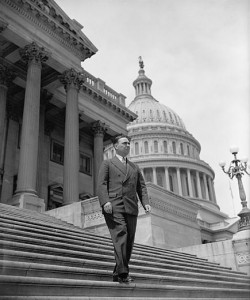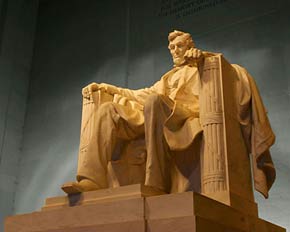Today, Chairman Ben Bernanke gave a big speech on the Federal Reserve’s next move in Boston. During his speech, Bernanke announced yet another round of “quantitative easing”. In plain English, this means that the Fed will fire up their printing presses to create more money. This likely won’t end well.
Federal Reserve System
Several monetary institutions appeared in the United States prior to the formation of the Federal Reserve System, or Fed. These were, in order: the constitutional gold (and bimetallic) standard, the First and Second Banks of the United States, the Independent Treasury, the National Banking System, clearinghouse associations, and the National Reserve Association. The Fed was the last such institution founded. Although it has endured, the present-day Fed would be unrecognizable to its founders.
Why Marco Rubio’s Win Is the Most Important One for Conservatives
Once you get past the fundamental qualifications of basic honesty and credibility, there are three ingredients, it seems to me, that make for a successful conservative leader.
The first (this should be obvious) is a solid conservative political philosophy. The second is charisma (like it or not, Americans prefer charismatic candidates, and it has become mandatory for the modern era).
Election Day Peptalk: America The Indestructible
No time to go wobbly: The Broadway Musical’s greatest Star fires up America’s greatest President…and all the rest of us. “You can do it, all you need is a hand…”
Top 10 Historic Midterm Elections
While not as memorable or studied as much as presidential campaigns, the midterm elections also stand as pivotal moments in U.S. history. Congressional elections, usually held in the middle of a president’s term, are usually a referenda on a president and his policies.
Dave Leip’s Atlas of U.S. Presidential Elections
Dave Leip’s Atlas of U.S. Presidential Elections was started as a paper hobby after the 1992 Presidential Election. I was 22 and attending graduate school at MIT. I made a photocopy of a U.S. map (with county boundaries) from one of the libraries and filled in counties with colored pen according to the winner. There were only two percentage points – above 45% and below 45%. I used the data for Perot, Clinton, and Bush that was published in the 1993 World Almanac and Book of Facts (there were no minor party data).
Commentary Magazine
Commentary is America’s premier monthly magazine of opinion and a pivotal voice in American intellectual life. Since its inception in 1945, and increasingly after it emerged as the flagship of neoconservatism in the 1970’s, the magazine has been consistently engaged with several large, interrelated questions: the fate of democracy and of democratic ideas in a world threatened by totalitarian ideologies; the state of American and Western security; the future of the Jews, Judaism, and Jewish culture in Israel, the United States, and around the world; and the preservation of high culture in an age of political correctness and the collapse of critical standards.
“The Report of our Death was Greatly Exaggerated.”
So whatever happened to the death of conservatism? Wasn’t it supposed to be long gone by now, crumbling within its sarcophagus, a dim memory of a discredited past? Didn’t we start hearing authoritative rumblings about its impending doom around the time of the last set of midterm elections, in 2006, when disillusioned ex-conservatives like Francis Fukuyama and soi-disant types like Andrew Sullivan began tuning their cellos of lamentation and discontent? Wasn’t that also approximately when disaffected conservative writers were proclaiming, in the pages of the Washington Monthly, that “It’s Time for Us to Go”? The talk was so deafening that I was moved to argue with it back in January 2007 in these pages in an article entitled “Is Conservatism Finished?” I concluded with some gingerness that it was not, but my conclusion came nearly two years before the most liberal candidate to run for the presidency in nearly half a century won a resounding victory.
FrontPageMag.com
David Horowitz was one of the founders of the New Left in the 1960s and an editor of its largest magazine, Ramparts. He is the author, with Peter Collier, of three best selling dynastic biographies: The Rockefellers: An American Dynasty (1976); The Kennedys: An American Dream (1984); and The Fords: An American Epic (1987). Looking back in anger at their days in the New Left, he and Collier wrote Destructive Generation (1989), a chronicle of their second thoughts about the 60s that has been compared to Whittaker Chambers’ Witness and other classic works documenting a break from totalitarianism. Horowitz examined this subject more closely in Radical Son (1996), a memoir tracing his odyssey from “red-diaper baby” to conservative activist that George Gilder described as “the first great autobiography of his generation.”






